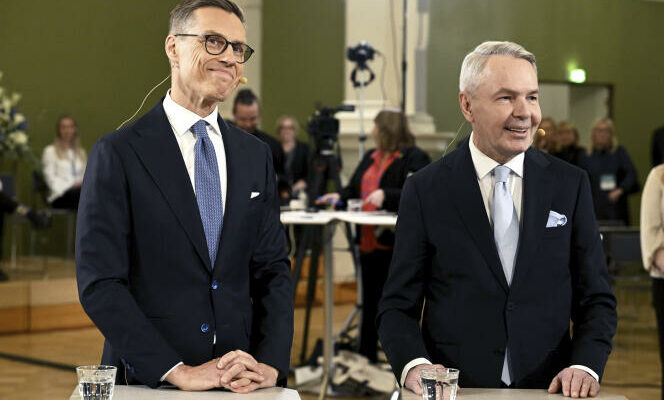The former conservative Prime Minister, Alexander Stubb, won the presidential election in Finland on Sunday February 11 against his rival, Pekka Haavisto, in a vote marked by tensions with neighboring Russia since the country’s accession to the North Atlantic Treaty Organization (NATO).
“It is absolutely incredible that a country the size of Finland can organize such fair and honest elections in this security policy context”welcomed Alexander Stubb in front of his supporters, after stopping by to greet Pekka Haavisto on his election night.
“It’s war in Europe and Gaza. It is important for the President of Finland to keep a cool head and strive to maintain peace here and work for peace elsewhere.”Mr. Stubb, 55, told public television Yle.
The final results credit him with 51.6% of the votes, compared to 48.4% for Mr. Haavisto, former minister of foreign affairs and member of the Greens, who ran as an independent. During this second round, 70.7% of some 4.3 million voters came to vote.
The new president, with limited powers compared to the prime minister, is due to take office on 1er March. Elected for six years, the head of state directs the country’s foreign policy in close cooperation with the government. He is also supreme commander of the armed forces. A notable role which has become even more important due to geopolitical developments in Europe and the entry into NATO of Finland, which shares 1,340 kilometers of border with Russia.
NATO membership
Neutral during the Cold War, the Nordic country ended three decades of military non-alignment after the invasion of Ukraine. It became a member of the Atlantic Alliance last year, to the great dismay of Russia, which promised to respond with “countermeasures”.
At the end of August, Finland faced an influx of migrants on its eastern border, accusing Moscow of orchestrating a migration crisis on its doorstep. Helsinki closed its border with its neighbor in November, a measure supported by all the candidates in the election.
” The fact that [le pays vienne] to join NATO is of considerable importance”because the way the Alliance will deploy in Finland “will largely be a task for the new president”notes Theodora Helimaki, political science researcher at the University of Helsinki.
Candidate of the National Coalition Party (center right), Alexander Stubb had already come first in the first round of the presidential election with 27.2% of the votes, ahead of the liberal Pekka Haavisto, member of the Green Party (25.8%). ). Both former foreign ministers, they share the same vision on the position to adopt towards Russia, with a strengthening of sanctions against Moscow.
The World Application
The Morning of the World
Every morning, find our selection of 20 articles not to be missed
Download the app
In 2022, the outgoing president, Sauli Niinistö, elected in 2012 and reputed to be the current European leader to have spoken most regularly with Vladimir Putin, contacted him directly to announce the decision to join NATO . Since then, there has been radio silence and neither candidate expects a phone call from the Kremlin after the election.
The difference between the candidates, both liberals, comes down in particular to the question of the storage and transport of nuclear weapons in Finland. Mr. Haavisto does not want to authorize them, although, as a member of NATO, the Nordic country must participate in exercises relating to the Alliance’s nuclear policy. Mr. Stubb for his part considered that the country should not exclude “no part” of NATO’s nuclear deterrence policy.
